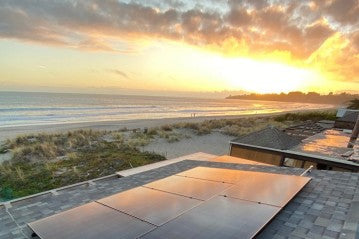
Solar energy has emerged as a powerful and sustainable solution to combat climate change and meet our growing energy needs. At the heart of this renewable revolution are solar panels, which convert sunlight into usable electricity. However, there is a common misconception that solar panels require direct sunlight to operate efficiently. In this blog post, we will delve into the workings of solar panels, explore the relationship between solar panels and sunlight, and determine whether direct sunlight is indeed necessary for optimal performance.
How Solar Panels Work?
To understand the relationship between solar panels and sunlight, it is essential to grasp the basic principles of how solar panels function. Solar panels are composed of photovoltaic cells that contain semiconductor materials like silicon. When sunlight strikes these cells, the photons in the light excite the electrons within the semiconductor, creating an electric current. This process, known as the photovoltaic effect, is the foundation of solar energy conversion.
Solar Panels and Sunlight: Understanding the Relationship
Contrary to popular belief, solar panels do not solely rely on direct sunlight for operation. While direct sunlight does provide the highest energy output, solar panels can still generate electricity under various lighting conditions. Several factors influence solar panel efficiency, including the intensity and angle of sunlight, temperature, and even the presence of clouds or shade.
Types of sunlight, such as direct sunlight, diffused sunlight, and indirect sunlight, impact solar panel performance differently. Direct sunlight, characterized by the sun's rays hitting the panels perpendicularly, produces the most significant energy output. Diffused sunlight, which occurs when the sun's rays are scattered by the atmosphere or clouds, can still generate a substantial amount of electricity. Indirect sunlight, such as light reflected off nearby surfaces, can also contribute to the overall energy production.
Do Solar Panels Need Direct Sunlight?
Solar panels do not necessarily require direct sunlight to function optimally. While direct sunlight produces the highest power output, solar panels can still generate electricity in less-than-ideal lighting conditions. Advances in technology, such as maximum power point tracking (MPPT), allow solar panels to adapt to varying light intensities. MPPT ensures that the panels operate at their most efficient point, maximizing electricity generation even in low light situations.
Furthermore, the positioning and angle of solar panels play a crucial role in their performance. By adjusting the tilt and orientation of the panels, they can capture sunlight more effectively throughout the day, even when the sun's position changes. This flexibility enables solar panels to generate power from different angles and orientations, reducing their reliance on direct sunlight.
Optimizing Solar Panel Performance
While solar panels can generate electricity in less-than-ideal lighting conditions, there are ways to optimize their performance and maximize sunlight exposure. Here are a few strategies:
1. Placement and Positioning: Install solar panels in areas that receive the most sunlight, such as rooftops or open spaces free from obstructions like tall buildings or trees. Position them at an optimal angle to capture the maximum amount of sunlight throughout the day.
2. Tracking Systems: Consider utilizing tracking systems that allow solar panels to follow the sun's movement. These systems adjust the panels' position automatically, optimizing sunlight capture and increasing overall efficiency.
3. Regular Maintenance: Ensure that solar panels are clean and free from debris, as dirt or dust accumulation can hinder their performance. Regular inspection and cleaning will help maintain optimal efficiency.
Conclusion
Solar panels are a remarkable innovation that harnesses the power of the sun to produce clean and renewable electricity. While direct sunlight yields the highest energy output, solar panels can still generate electricity under various lighting conditions. Understanding the relationship between solar panels and sunlight is vital to maximize their performance and make informed decisions when implementing solar energy solutions.
So, the next time you wonder whether solar panels need direct sunlight, remember that they are adaptable and capable of generating electricity even in diffused or indirect light. Embracing solar energy and the potential of solar panels will lead us towards a more sustainable and greener future.

0 Kommentare